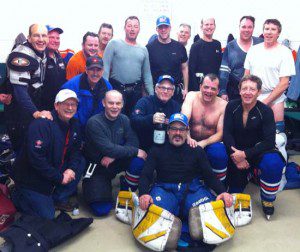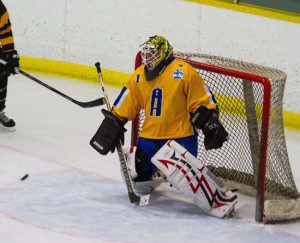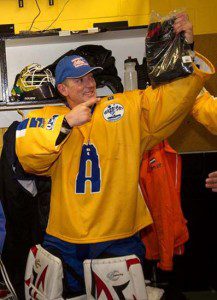
We were just peeling off our hockey gear. We were considering a little refreshment after what we thought was a Pyrrhic victory; in others words, we had won our final game of the oldtimers’ tournament, but figured we were out of the running to win the championship in our division. Then, suddenly, in came the tournament organizers – members of the Uxbridge Islanders hockey club – and they were carrying what looked like a box of prizes.
“You guys won!” they told us. “The other team got too many penalties in their last game and you won on points.”
They could have knocked most of us over with a feather. We had played fairly well – winning two of our three games in the one-day tournament – but since the one team we’d failed to defeat seemed to be walking all over the competition, we calculated we’d finish second. But we – members of the Uxbridge Oilies hockey club – had calculated wrong. If we’d read the rules more carefully, we’d have realized that our wins (worth 10 points each) combined with our goals (one point per goal) and very few penalties (a half a point deduction each) left us with more points than the team that defeated the rest of the field.
“The devil is in the details,” I remarked to one of my teammates.
In fact, the day was chock full of fascinating details, not just our game-winning statistics. Among some of the other details, I faced a rather large statistical hill in my office – a pile of assignments from my journalism students. And throughout the day, when I wasn’t on the ice with my hockey teammates, I was barricaded in my office editing and evaluating a pile of about 40 short feature stories. Each was about three pages long. Each took about 20 to 30 minutes to edit and mark.
And so, I calculated between each of our three games on Friday, I had three hours during which I could mark about eight or nine stories. I felt a little like Lucille Ball on that famous chocolate candy assembly line. Could I finish a sufficient number of assignments during the breaks between hockey games? As it turned out, some other details altered my best-laid marking plan.

During our third and final tournament game (the one after which we learned we’d won our division), the goaltender on our opponents’ team was hurt. The game came to a stop until they’d helped the injured player off the ice. But that left the game minus a goalie and nobody likes to play (even a recreational hockey game) without two goalies. Fortunately, there was another goalie dressed in the building and he offered to fill in. His own game wouldn’t start for a while yet, so he volunteered to play in our game to keep it competitive. When he came on the ice, we all remarked at his colourful jersey.
“It’s the Dutch team goalie,” somebody said.

I suddenly remembered why he was in the arena. Some years previously, a local hockey player had gone to the Netherlands to play semi-professional hockey. While he was there he had befriended a team in northern Holland, called the Leeuwarden Warriors. They had always threatened one day they would travel to Canada to do some sightseeing and to play in a local oldtimers’ hockey tournament. This was the week they had chosen. After our game ended and we learned we’d won, I decided to pay the Dutch goalie a visit to thank him. He was still playing his final tournament game, which the Warriors lost. That’s when I hatched a plan.
I gathered some of my Oilies teammates, took one of our tournament-winning prizes and marched down to the Leeuwarden Warriors’ dressing room. Amid the general mayhem of the post-game banter in the room, I apologized for interrupting and explained that even though the Warriors hadn’t won their division, they weren’t going home empty-handed. I thanked their goalie, Sjouke Flisijn, for filling in during our game and gave him one of our prizes as well as an Uxbridge Oilies ball cap. I had also dashed home quickly for an additional memento I thought he might appreciate.

“One of my prized possessions from numerous trips to Second World War battlefields in Holland, where Canadians fought in 1944-45,” I said, and the room fell silent as I spoke, “is this Holland-Canada friendship pin of our two flags. It symbolizes the strong bond between our two countries going back 70 years.”
Then, an amazing thing happened. As I gave the pin to goaltender Flisijn and shook his hand, all his Dutch teammates rose and applauded. They then broke into a spontaneous singing of “O Canada.” By the end of the anthem, there wasn’t a dry eye in the room.
A few choice details had left some indelible sights and sounds from a memorable day.